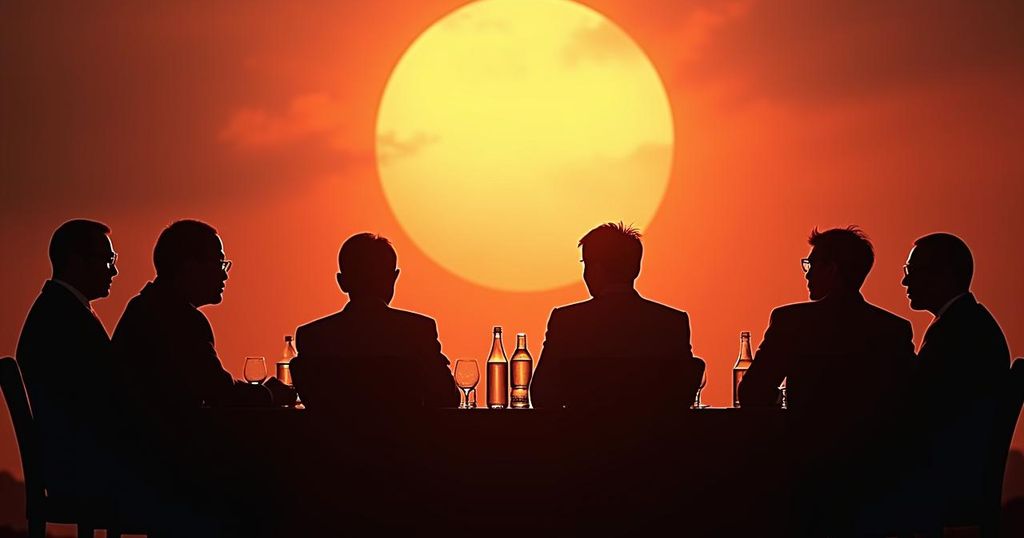Southeast Asian leaders convened in Laos to discuss the civil war in Myanmar and South China Sea tensions, engaging with global powers like the U.S. and China. The summit aims to enhance ASEAN’s cooperation amidst complex geopolitical environments, with significant discussions around Myanmar’s military governance and territorial disputes. Cambodian and Philippine clashes with Chinese forces have heightened concerns, overshadowing the bloc’s efforts for stability and peace in the region.
Laos has become the focal point for a crucial summit of Southeast Asian leaders convened to address pressing regional issues, particularly the ongoing civil strife in Myanmar and intensifying territorial conflicts in the South China Sea. The gathering of the Association of Southeast Asian Nations (ASEAN) in Vientiane will subsequently involve dialogues with major global powers including China, the United States, and Russia, each vying for influence in the region. The summit’s agenda is significant, as it coincides with rising tensions in the Middle East, albeit Southeast Asia’s involvement remains minimal. Historically, ASEAN has struggled to assert its influence internally and among its 10 member nations—Brunei, Cambodia, Indonesia, Laos, Malaysia, Myanmar, the Philippines, Singapore, Thailand, and Vietnam—while providing a stage for superpower engagement. In his opening remarks, Lao Prime Minister Sonexay Siphandone expressed the importance of unity and collaboration among ASEAN members and their dialogue partners. Notably, the summit welcomes new leaders, including Thailand’s Paetongtarn Shinawatra, the youngest leader at 38 years old, and Singapore’s Lawrence Wong, who recently succeeded long-time Prime Minister Lee Hsien Loong. However, the summit will continue in the absence of Indonesian President Joko Widodo, who has delegated Vice President Ma’ruf Amin to represent the nation. This summit also marks the inaugural foreign visit by Japan’s recently appointed Prime Minister Shigeru Ishiba. The United States’ representation will be led by Secretary of State Antony Blinken in place of President Joe Biden, with China represented by Premier Li Qiang. A central topic for discussion is the fraying relationship between the U.S. and China, influenced by Beijing’s aggressive maneuvers in the South China Sea, which has witnessed multiple clashes between Chinese and Philippine vessels this year, alongside allegations of assaults against Vietnamese fishermen by Chinese forces. Negotiations over a longstanding code of conduct between ASEAN nations and China concerning the contested waters have yet to yield significant advancements. Research fellow Muhammad Faizal Abdul Rahman cautioned against expecting clear resolutions, indicating that many ASEAN nations prioritize relations with Beijing over regional solidarity. Blinken is anticipated to advocate for sustained pressure on Myanmar’s military regime, highlighting the lack of progress relative to ASEAN’s peace plan advocating for ceasefires and mediation. The planned elections in Myanmar have been criticized as lacking representativeness and inclusivity, potentially exacerbating violence within the state. ASEAN’s credibility is being scrutinized due to the protracted conflict in Myanmar following the military coup in 2021, with much of the territory now under the control of various armed factions opposed to the military government. In upcoming consultations, Thailand is set to orchestrate discussions about Myanmar in December, although attendance from the military-led government remains uncertain. Nonetheless, Myanmar’s Foreign Ministry has dispatched its permanent secretary Aung Kyaw Moe to the summit, which some experts interpret as ASEAN showing signs of fatigue in addressing the Myanmar crisis, with doubt cast on the potential for any significant breakthroughs from these discussions.
The Southeast Asian region is currently facing significant geopolitical challenges, particularly stemming from the conflict in Myanmar that began with a military coup in 2021, which ousted the elected government. This internal conflict has led to continuous violence and unrest, affecting several ASEAN member nations and testing the bloc’s ability to maintain unity and effectiveness. Furthermore, the South China Sea remains a contentious area due to overlapping territorial claims between China and several ASEAN nations, particularly Vietnam, the Philippines, Malaysia, and Brunei. The strategic importance of this region fuels both economic interests and geopolitical tensions, making the cooperation among Southeast Asian nations and their dialogue with global powers crucial for regional stability.
In conclusion, the gathering of Southeast Asian leaders in Laos underscores the complexities and challenges confronting the region, particularly concerning the civil war in Myanmar and territorial disputes in the South China Sea. The outcomes of this summit and subsequent discussions with global powers will be pivotal in shaping ASEAN’s credibility and effectiveness in addressing these pressing issues. Ongoing discussions emphasize the necessity for unity, strategic cooperation, and a balanced approach to avoid conflicts while advancing mutual national interests.
Original Source: www.thespec.com






